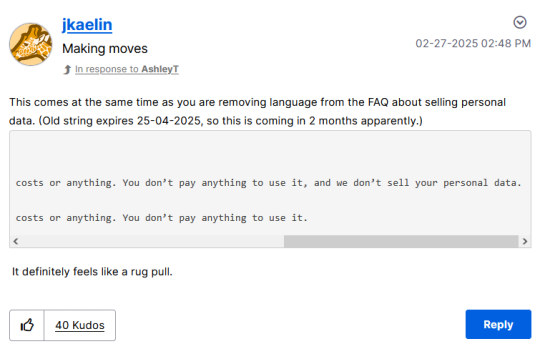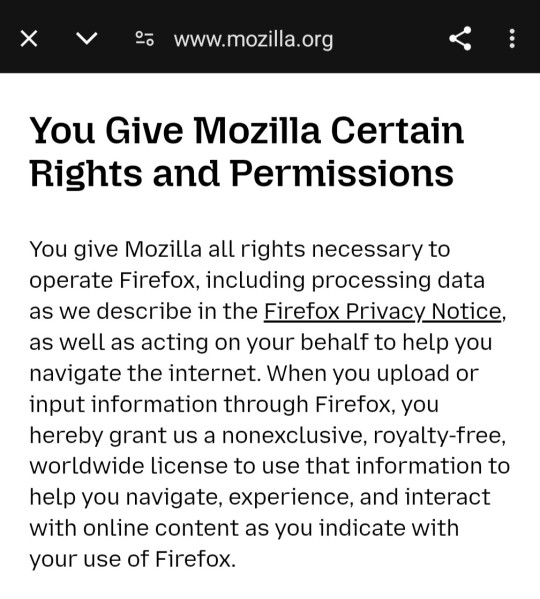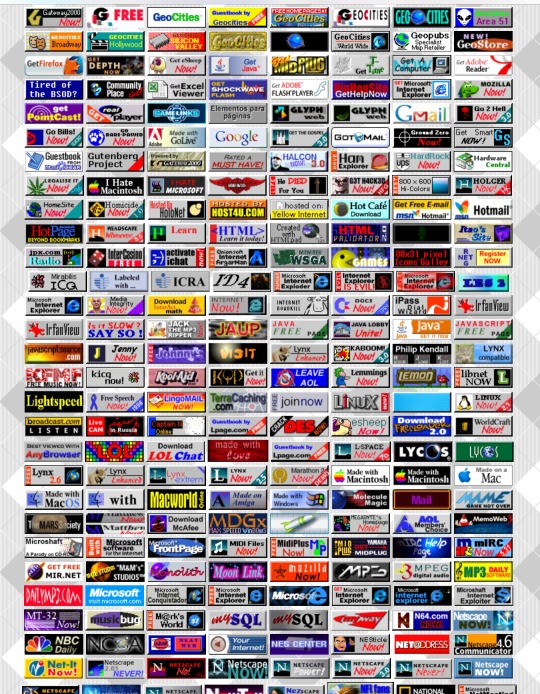#Mozilla
Explore tagged Tumblr posts
Text
Hey guess what? Firefox's creator, Mozilla, is considering whether to integrate an AI button/feature into their browser. If you, like me, use Firefox and wish to offer feedback, here is the thread: https://connect.mozilla.org/t5/discussions/share-your-feedback-on-the-ai-services-experiment-in-nightly/td-p/60519
Pass it on.
12K notes
·
View notes
Text
Mozilla is being sketchy, people in the responses to this go over why this change is bad but basically they're making users agree to have their data harvested in order to use Firefox
1K notes
·
View notes
Text
heads up for firefox users who care about their privacy and don't want their data sold to third parties.
they just updated their TOU policy with some shady shit

they're claiming they "need" a license to use this data to provide basic services and functionality but they have never had this before or needed it previously to do what they were already doing (render web pages/integrate a search engine) having purchased a license to "use" your search data (and potentially anything you upload through the service?), maintaining it for up to 25 months on private servers, they also updated their FAQ 2 months ago to redact an important line:

they've got reps on their blog rn trying to do damage control but honestly i think the service is cooked. personally, i think they just want to use our data to train an LLM, which of course we won't be able to opt out of the use of once launched. maybe i'm wrong, but i think it's pretty likely

if you're looking for alts (& imo using anything chromium-based is just an even worse backslide) apparently there's a firefox fork called waterfox (and another called librewolf) that's committed to privacy, but i legit haven't looked into them and can't vouch. i know I'll be looking into alts in the coming days :/
695 notes
·
View notes
Text
Mozilla? Chrome? Step aside, browser warriors.


We've found the winner.
#Pokemon#Pokemon silver#Pokemon gold#Mario tennis#Mario#Nintendo#internet browser#chrome#firefox#mozilla#lugia#2000s internet#2000s#millennial
6K notes
·
View notes
Text

Firefox 2.0 CD from the Mozilla Store (2007)
1K notes
·
View notes
Text
Install Floorp. You can do it with Floorp. You can use Floorp and browse it. Download Floorp right now. Install Floorp. Dive into Floorp. You can Floorp it. It's on Floorp. Floorp has it for you. Floorp has it for you.
#floorp#sorry 😭😭 i love floorp but wtf is that name#linuxposting#linux#firefox#mozilla#foss#open source
397 notes
·
View notes
Text
uhm...
WTF MOZILLA???

When you upload or input information through Firefox, you hereby grant us a nonexclusive, royalty-free, worldwide license to use that information to help you navigate, experience, and interact with online content as you indicate with your use of Firefox.
307 notes
·
View notes
Text
there's a lot of fear mongering around the new firefox terms of service and privacy policy and most of all of it is bullshit and, just fear mongering. One thing that is concerning however is the following:
Your use of Firefox must follow Mozilla’s Acceptable Use Policy, and you agree that you will not use Firefox to infringe anyone’s rights or violate any applicable laws or regulations.
Before this would only apply to mozilla services such as the matrix chat, firefox send (rip), the vpn, or whatever, but now they are saying it is applied to the browser as well.
And one of the things you shouldn't do according to the policy is, you guessed it:
Upload, download, transmit, display, or grant access to content that includes graphic depictions of sexuality or violence
So mozilla (perhaps accidentally, companies love to do this but also mozilla is kind of stupid), just said you cannot use firefox to browse porn. If it is intentional and they double down on this (which I'm really not sure if they even can, firefox is a program running locally on your computer, it's not a service they can just ban you from or anything like that, again, mozilla is a bit stupid), it's not a reason to use chromium. In the terms of service they also write:
These Terms only apply to the Executable Code version of Firefox, not the Firefox source code.
"the Executable Code" is vague, like does it count if you build it locally on your computer, or is it just the mozilla packaged versions of it downloaded from official sources or whatever idk.
But i think it would make sense forks don't count as the terms apply to "Firefox" and not anything else. So here's some alternative browsers which aren't firefox, but are firefox based:
Librewolf: just firefox, all the crap removed, and lots of privacy features turned on as well. Google is disabled in the search bar, but you can enable it again with a bit of a hack, and by default, history and cookies is cleared when you close it. You can turn that off easily. Basically identical to regular firefox otherwise, it's what i'm currently using.
Zen: Very new but gaining popularity quickly. kind of buggy due to it's recency, but people seem to love it. Main focus is customization, but with improvements in privacy, and speed. Pretty different from other browsers, but that might be what you want.
thats. basically the main two rn. i dont think anything else really would be good for most people and even as someone who really likes to get into things deep with privacy and security and shit i think librewolf is just fine. there's lot of other options but they're kinda all in the categories that these two cover.
While nowhere near in a state to be used as a regular browser, i would keep your eyes on Ladybird which is undergoing the insane challenge of making a web browser from scratch; it's not based on chromium or firefox. The first alpha version is projected to come out next year and it seems very promising.
274 notes
·
View notes
Text

With Firefox having AI added in the recent update. Here's how you can disable it.
Open about:config in your browser.Accept the Warning it gives.Search browser.ml and blank all values and set false where necessary as shown in the screenshot, anything that requires a numerical string can be set as 0 .Once you restart you should no longer see the Grey-ed out checkbox checked, and the AI chatbot disabled from ever functioning.
#mozilla#mozilla firefox#firefox#web browsers#pro tip#protips#anti ai#fuck ai#internet#how to#diy#do it yourself#artificial intelligence#signal boost#signal b00st#signal boooooost#ausgov#politas#auspol#tasgov#taspol#australia#fuck neoliberals#neoliberal capitalism#anthony albanese#albanese government
469 notes
·
View notes
Text





#mdzs#cql#the untamed#incorrect mdzs#incorrect quotes#jin guangyao#lan xichen#mozilla#tumblr within tumblr#had to share this gem
656 notes
·
View notes
Text
So Firefox has a new ToS and an updated privacy notice that does not look like good news.
I'm sure you have seen some posts about it already. It seems like Mozilla now has the right use whatever data you upload through Firefox for their own purposes.
In a blog post, Mozilla insists that this doesn't mean they "own" your data and that they aren't they aren't selling your data, but that's not reassuring me that this isn't a breach of trust. The ToS sure seems like it allows them to sell user data. If Mozilla doesn't own the data then they can be sued, but only if they're caught red-handed.
Even if they aren't selling user data, they could very well be using it to train their generative AI. That's not exactly better Mozilla.
So what? Is there no safe haven with browsers? Pfft, no are you kidding? There have been Firefox alternatives for years. Anyone paying attention to Mozilla could see they weren't exactly the bastions of privacy that they claimed to be, but luckily, Firefox is built on the open-source browser engine called Gecko! If you don't want Mozilla, cut'em out!
There are many forks out there to use. Just off the top of my head there's uuuuh
Waterfox
Librewolf
IronFox (for Android)
Floorp
Mercury
GNU IceCat
Tor Browser
There's more, I know it. Use whatever works for you! I personally settled on Waterfox just cause it functions very very similarly to Firefox with all of Mozilla's bloat removed. (all of the options remove Mozilla bloat anyway. Increases performance!)
Librewolf and Tor are way more privacy focused if you're into that.
I don't know much about the rest, but I know people who use them and I've yet to hear anything particularly bad about any.
You're not stuck with chromium.
#mozilla#fieefox#browsers#hopefully mozilla gets their act together#their constant downhill momentum has been frustrating to see
155 notes
·
View notes
Text



Web buttons from the 1990’s-2000’s
#old web#web design#webcore#early web#geocities#web buttons#1990s#nostalgia#nostalgic#2000s#early 2000s#netscape#internet#internet explorer#www#world wide web#browser wars#mozilla#firefox#intel#browser#Hotmail#Cern#Hypertext#gopher#AOL#yahoo#Windows 95#dot com#dot com bubble
258 notes
·
View notes
Text
The Linux Foundation choosing to financially support Blink (Chromium) over Gecko (Firefox) is certainly a choice.
I've criticized a lot of Mozilla's actions in the past as they fight to break even, but if I was the financially struggling backbone of an entire niche desktop platform, and said platform decided to give copious amounts of time and money to my anti-consumer rival (who is very much trying to monopolize me into non-existence) then I'd probably turn into the joker, too. Damn.
#rambles#google#fuck google#alphabet inc#chromium#google chrome#firefox#mozilla#mozilla firefox#linux#the linux foundation#linux foundation#web browsers#corporate america
189 notes
·
View notes
Text
You either die a hero or you live long enough to see yourself become the villain ...

129 notes
·
View notes
Text
me when companies try to force you to use their proprietary software

anyway
Layperson resources:
firefox is an open source browser by Mozilla that makes privacy and software independence much easier. it is very easy to transfer all your chrome data to Firefox
ublock origin is The highest quality adblock atm. it is a free browser extension, and though last i checked it is available on Chrome google is trying very hard to crack down on its use
Thunderbird mail is an open source email client also by mozilla and shares many of the same advantages as firefox (it has some other cool features as well)
libreOffice is an open source office suite similar to microsoft office or Google Suite, simple enough
Risky:
VPNs (virtual private networks) essentially do a number of things, but most commonly they are used to prevent people from tracking your IP address. i would suggest doing more research. i use proton vpn, as it has a decent free version, and the paid version is powerful
note: some applications, websites, and other entities do not tolerate the use of VPNs. you may not be able to access certain secure sites while using a VPN, and logging into your personal account with some services while using a vpn *may* get you PERMANENTLY BLACKLISTED from the service on that account, ymmv
IF YOU HAVE A DECENT VPN, ANTIVIRUS, AND ADBLOCK, you can start learning about piracy, though i will not be providing any resources, as Loose Lips Sink Ships. if you want to be very safe, start with streaming sites and never download any files, though you Can learn how to discern between safe, unsafe, and risky content.
note: DO NOT SHARE LINKS TO OR NAMES OF PIRACY SITES IN PUBLIC PLACES, ESPECIALLY SOCAL MEDIA
the only time you should share these things are either in person or in (preferably peer-to-peer encrypted) PRIVATE messages
when pirated media becomes well-known and circulated on the wider, public internet, it gets taken down, because it is illegal to distribute pirated media and software
if you need an antivirus i like bitdefender. it has a free version, and is very good, though if youre using windows, windows defender is also very good and it comes with the OS
Advanced:
linux is great if you REALLY know what you're doing. you have to know a decent amount of computer science and be comfortable using the Terminal/Command Prompt to get/use linux. "Linux" refers to a large array of related open source Operating Systems. do research and pick one that suits your needs. im still experimenting with various dispos, but im leaning towards either Ubuntu Cinnamon or Debian.
#capitalism#open source#firefox#thunderbird#mozilla#ublock origin#libreoffice#vpn#antivirus#piracy#linux
654 notes
·
View notes
Text

Make Way for Mozilla PC Mag - December 2004
402 notes
·
View notes